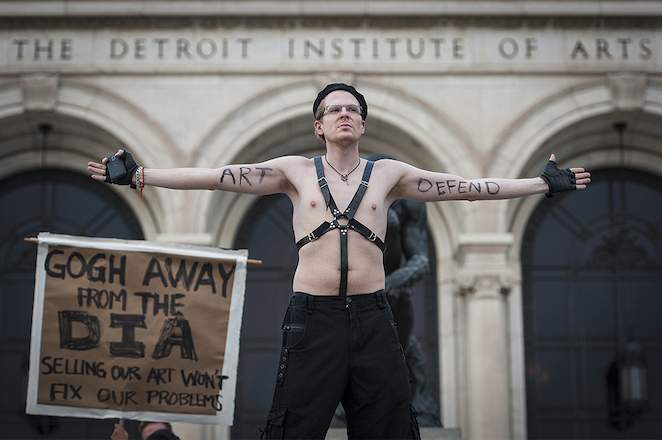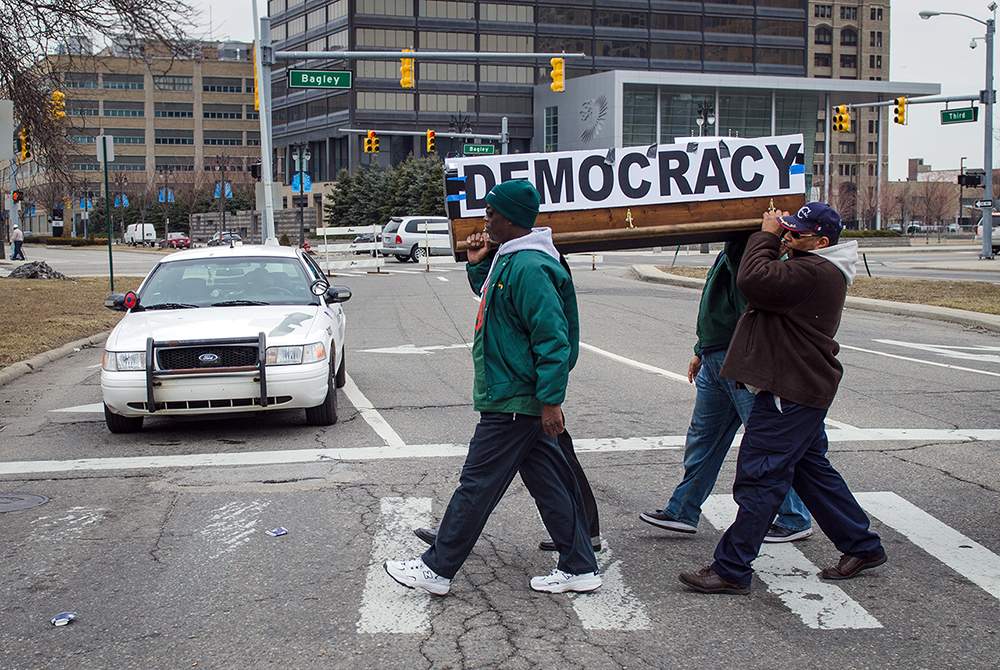Detroit, Michigan. The year was 2013. On July 18, the city declared Chapter 9 bankruptcy with an estimated $18-20 billion in debt. The rarity of municipal bankruptcies begets the question: How did this happen in Detroit, and how did the city fix it?
It’s the latter question — Detroit’s climb out of bankruptcy — that takes center stage in Gradually, Then Suddenly: The Bankruptcy of Detroit, the newest release from Sam Katz’s History Making Productions and the 2021 winner of The Library of Congress Lavine/Ken Burns Prize for Film. The film gets its name from a famous quote about bankruptcy in Ernest Hemingway’s The Sun Also Rises.
The story begins with a focus on the automobile industry. Detroit was home to a booming automotive industry that began to shrink in the 1970s. As manufacturers moved out of the city and into the suburbs, the city’s population rapidly dwindled. In 1950, Detroit had 1.8 million residents. By 2012, the population had declined to less than 700,000. This rapid decrease in population resulted in an erosion of the tax base and a decline in city services.

It was in 2007 and 2008, though, during the recession, when the City became even more indebted, further exacerbating rising debt. By 2013, when the City had $3.5 billion in underfunded pension liabilities, and had promised health care to retirees at a lifetime cost of $5.7 billion dollars — along with another 9 or so billion dollars (!!!) in liabilities — Detroit had no other option: It was time to file for bankruptcy.
The story gets even more riveting from there. At the center of this ascent out of debt was a valuable asset for the City of Detroit: the Detroit Institute of Arts Museum. The City owned the museum, and the art had often been bought with City money. The collection, including masterpieces by Rembrandt, Matisse, and Picasso, was at risk of being auctioned off to provide money for bankruptcy. A fight was brewing. On one side: the unions and city departments who were having their budgets cut; on the other: art lovers.
This fight, Katz acknowledges, was inherently divided. “It’s unfortunately racial. It’s Black/White. It’s city/ suburb. It’s Democrat/Republican. It’s state/city. It’s a series of clashes,” he says.
Alarmed at the prospect of auctioning off the art collection, foundations to save the art museum swooped in, pledging massive funds provided they could receive matching from the state. Spearheaded by the Ford Foundation, who contributed $125 million, the foundation and the state of Michigan amassed $816 million which would go towards paying the pensions. This gave the City a 10-year break on contributing to the pension fund, and allowed for a reinvestment into City services. A happy ending, at least for the time being.
Gradually then Suddenly trailer from James C. McGovern on Vimeo.
A story only Katz could tell
Katz has unique qualifications to tell this story. A public finance professional for over 30 years, he worked with states and local governments on a host of financial issues. He was appointed to the Pennsylvania Intergovernmental Cooperation Authority (PICA), the financial oversight board for the City of Philadelphia in 2011. He also ran for Mayor twice, as a Republican. (Katz wrote a series of articles for The Citizen analyzing the 2023 primary.)
As Katz started to learn more about the Detroit bankruptcy, he realized what a compelling story it was, and that his experience with both filmmaking and public finance was a rare combination that would make him the right person to bring the story to life.
Katz partnered with James McGovern, a Detroit-based filmmaker whom Katz describes as a “superb” visual thinker, and Nathan Bomey, the reporter who covered the bankruptcy for The Detroit Free Press; Bomey served as the producer/co-director and principal scriptwriter. It was this team, Katz says, that put together a documentary that “started out really as a finance film, but ended up as a human story.”
The film, which Katz says is a “universal” and “relevant” story, will be shown at the Comcast Technology Center on Monday, June 5, from 6 to 9pm. Following the screening, guests will be joined by Katz and beloved 6ABC producer emeritus Jim Gardner, who has served as a sounding board for Katz throughout this process, for a discussion.
This screening will be the first of many. Katz and his team are taking the show on the road, traveling to more than a dozen cities across the country over the next year. In addition, Katz is working to partner with streaming services and higher education institutions to make the film accessible to a wider audience.
Monday, June 5, 6-9pm. Free with RSVP. Comcast Technology Center, 1800 Arch Street
Correction: A previous version of this story misstated the last name of the Detroit Free Press reporter who covered the bankruptcy. It is Bomey.
![]() MORE ARTS AND CULTURE FROM THE CITIZEN
MORE ARTS AND CULTURE FROM THE CITIZEN



